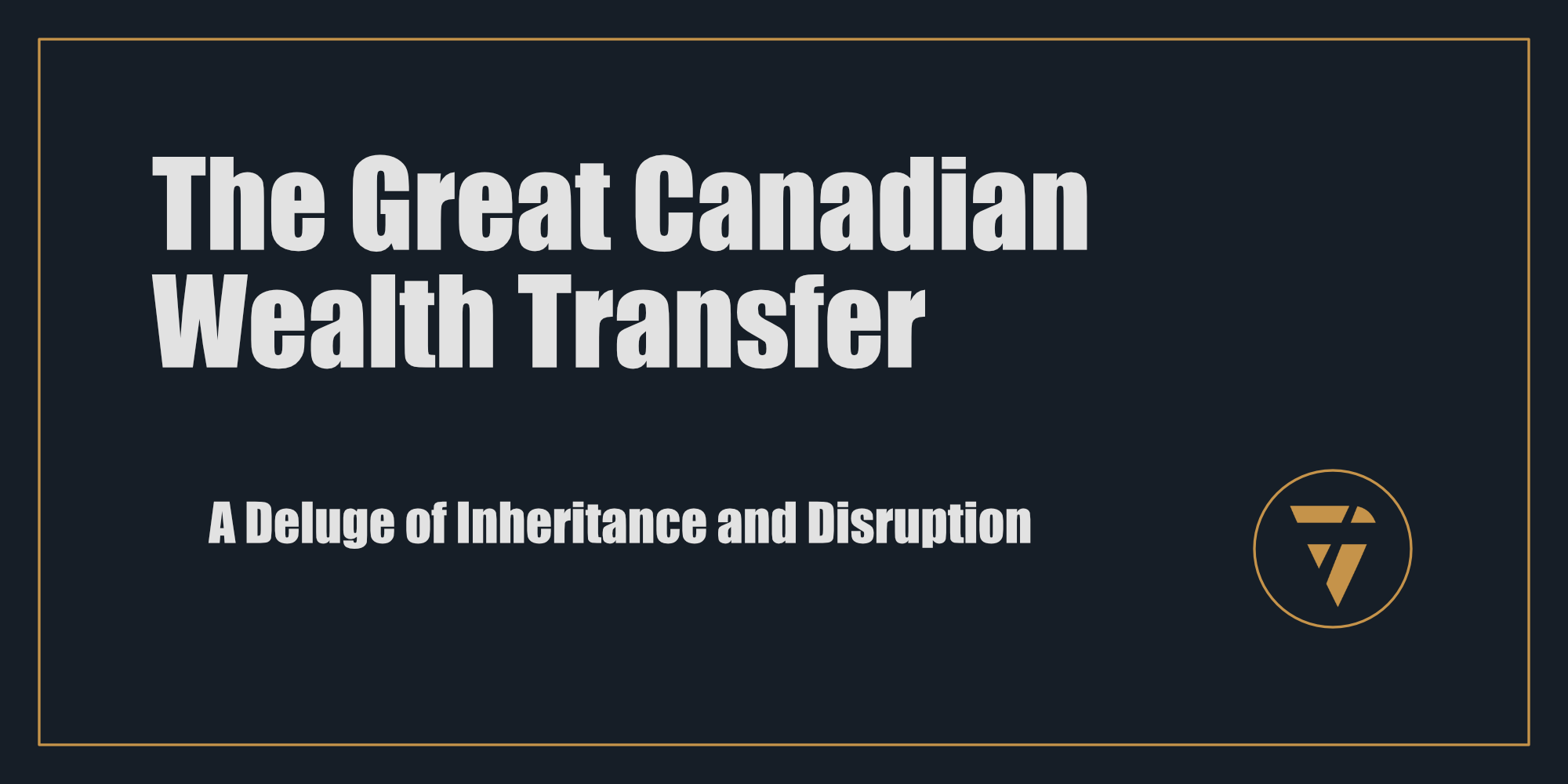The Great Canadian Wealth Transfer

A Deluge of Inheritance and Disruption
Canada is on the cusp of an unprecedented wealth transfer. Over the next decade, baby boomers—holders of immense wealth accumulated through real estate, business ownership, and traditional investment vehicles—will pass down an estimated $1 trillion to $3 trillion to their heirs. This shift is not merely an economic event, but a profound societal upheaval, one that will reshape class structures, redefine concepts of worth, and create generational friction.
This wealth, amassed under old economic structures, is now falling into the hands of millennials and Gen Z inheritors, many of whom are ill-prepared for its weight. Unlike their parents, they have spent their formative years in an era of high debt, economic instability, and a shifting relationship with capitalism itself. This creates a paradox: enormous wealth meeting financial inexperience, in a society with no clear roadmap for how to manage this scale of transition.
The results? Status fog, wealth dissonance, inflationary spikes, asset misallocation, and deepening economic stratification. Primed and fattened for the new predators.
1. The Demographics of Wealth Transfer: Who Gets What?
Baby boomers currently own more than half of Canada's total wealth. Their net worth has been built on:
- Real estate: Primary homes that appreciated tenfold since the 1980s.
- Private businesses: Over 60% of small and mid-sized businesses in Canada are owned by those over 55.
- Investment portfolios: Stocks, bonds, and pensions that have outperformed wage growth.
Their heirs—millennials and Gen Z—have grown up in a completely different financial environment. They have faced:
- High student debt and stagnant wages.
- A disconnected relationship with asset accumulation (fewer homeowners, less investment knowledge).
- A preference for experiences over ownership, a direct contrast to their parents’ wealth-building habits.
As boomers pass away, this mismatch in financial literacy and wealth expectations creates a volatile intergenerational transfer, where inherited money often evaporates through poor decision-making, unchecked spending, and economic naïveté.
2. The Mismanagement of Inheritance: The First-Generation Wealth Problem
History is clear: 70% of inherited wealth is lost by the second generation, and 90% by the third. This is not just a statistic—it’s a warning. First-generation inheritors often make critical mistakes, including:
- Asset Liquidation at the Wrong Time: Selling inherited property during housing downturns.
- Bad Investment Decisions: Moving wealth from passive-growth vehicles into speculative trends.
- Overestimating Wealth Longevity: A $1 million inheritance may feel vast but, without strategic management, can disappear in a blink.
- Lifestyle Inflation: The sudden psychological shift from scarcity to abundance often fuels unsustainable spending.
Most boomers built their wealth through discipline, long-term asset growth, and business acumen—qualities that many inheritors have not been forced to develop.
The greatest risk? This wealth transfer could lead to the largest destruction of generational wealth in modern Canadian history.
3. Status Fog and the Erosion of Traditional Class Structures
A key psychological fallout of this wealth shift is status fog—a phenomenon where individuals struggle to place themselves within a coherent class hierarchy.
For decades, class in Canada was relatively straightforward:
- Boomers defined class through work, property, and pension accumulation.
- Younger generations defined success through access, experience, and mobility.
Now, the children of middle-class boomers will suddenly find themselves wealthy—without having done anything to earn it.
- They won’t identify with their working-class peers but will lack the network and financial literacy of the wealthy.
- They will experience imposter syndrome within the upper class, while simultaneously being resented by their own generation.
- They will struggle to integrate into traditional financial systems, leading many to burn through their inheritance before they have time to properly utilize it.
In effect, wealth will exist in limbo, creating a temporary, unstable economic middle—neither poor nor rich, but destructively misaligned.
4. Economic and Inflationary Shockwaves
This transfer will have serious macroeconomic effects:
- Inflation in Luxury & Speculative Markets: As inexperienced inheritors receive cash, expect price inflation in luxury goods, crypto, NFTs, and high-risk investments.
- Housing Markets in Chaos: Many heirs will sell inherited homes for cash, increasing housing supply in boomer-heavy neighbourhoods, while also inflating demand in trendy urban centres.
- Venture Capital Surges & Losses: Expect a rise in inexperienced angel investing—many inheritors will blindly fund startups without proper due diligence, leading to a wave of failed ventures.
- Increased Demand for Wealth Advisory Services: The financial industry will pivot heavily towards education-based wealth management, trying to save inheritors from their worst impulses.
Ultimately, most of this transferred wealth will cycle out of circulation within a single generation, moving from private hands into corporate holdings, government taxation, and unsustainable spending.
5. The Future of Work, Ownership, and Legacy
This wealth transfer also challenges core economic assumptions about work, value, and legacy.
Work vs. Wealth
Millennials and Gen Z have already begun rejecting traditional work structures. As they inherit large sums, expect a decline in workforce participation, a rise in nomadic living, and an increase in alternative income models (investment dividends, passive rental income, creative entrepreneurship).
A Business Succession Crisis
- Over $2 trillion worth of businesses are currently owned by boomers.
- Most inheritors don’t want to take over family businesses, meaning thousands of companies will either collapse or be sold to corporations.
- This will accelerate corporate consolidation, further reducing small business competitiveness.
New Models of Worth and Value
As wealth shifts without work effort, it forces a re-evaluation of what ‘earning’ actually means.
- Does wealth still need to be “earned,” or does inheritance challenge that belief?
- Will we see a cultural divide between those who inherit and those who have to build?
- Will wealth become more “liquid” in the hands of Gen Z, leading to a reinvention of how it circulates?
The next decade will force a fundamental redefinition of worth, work, and financial identity.
I grew up in a community that started where if your family was Conservative, you got free land, grants, loans, and favours. Everyone else had to grind and buy every acre.
Those divisions and feelings still exist today, 150 years later, on the same fence lines. Bitterness over who had to earn what. And those families that had everything given to them are the most miserly, miserable, cheap and heartless people today. They have the most.
The families that had to build... those are the most generous, kind, and focused on growth. They have less individually, but their communities are happy, and strong.
It's the difference between knowing how to make something, or only knowing how to take. We see that clearly in the world today. Makers, and takers.
The Coming Reality Check
Canada’s wealth transfer will create more millionaires than ever before—but only temporarily. Most of this new wealth will dissipate through mismanagement, economic shifts, and generational friction.
The key question is not who gets the money, but who keeps it. The winners will be those who learn to manage wealth like their boomer parents did: patiently, strategically, and without impulse.
This is a rare moment in history—a financial redistribution of staggering proportions. The choices made in the next decade will determine whether this wealth is sustained or lost.
The next era belongs to those who plan for it.
This is what I’m working on. Tell me what you think, I enjoy the conversation! Subscribe and follow the work in real time.
Thanks!
B

The largest wealth transfer in Canadian history is coming. Boomers built it. Their kids will inherit it. Most will lose it.
Wealth without wisdom is a liability.
$3 trillion is about to change hands. The question is: who will keep it?
PS -






